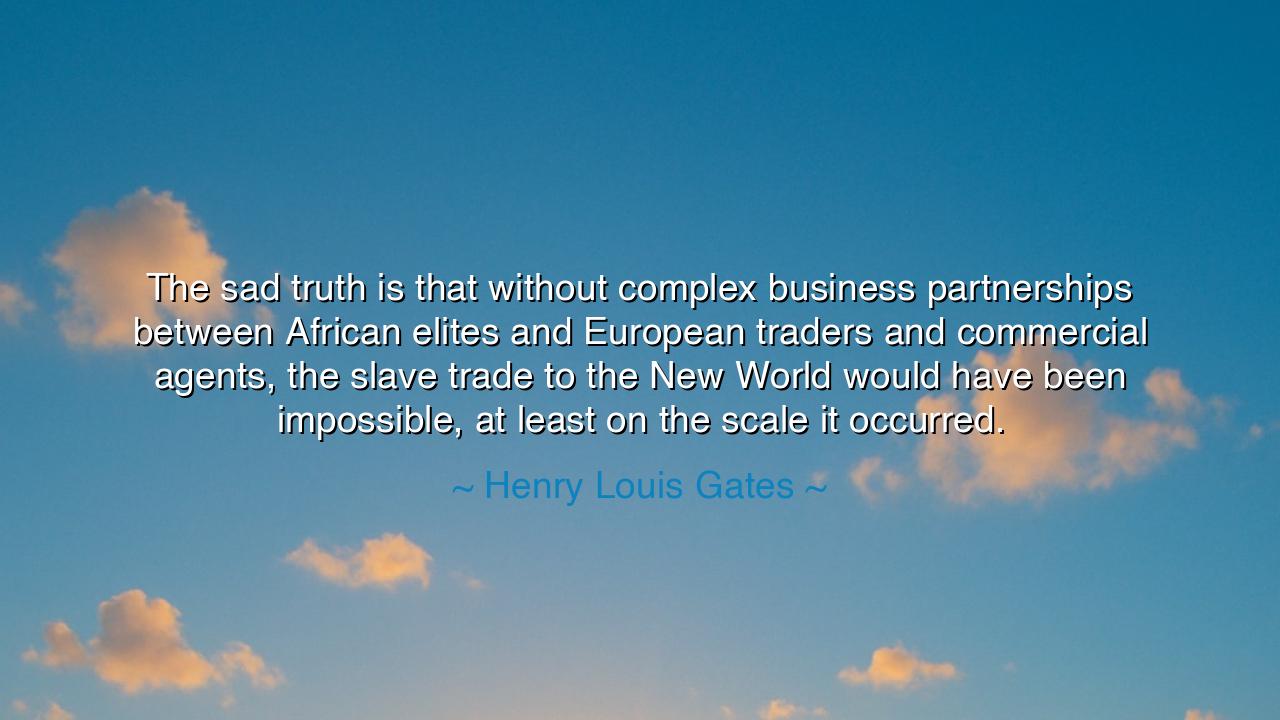
The sad truth is that without complex business partnerships
The sad truth is that without complex business partnerships between African elites and European traders and commercial agents, the slave trade to the New World would have been impossible, at least on the scale it occurred.






Hearken, children of remembrance, to the solemn words of Henry Louis Gates, who declares: "The sad truth is that without complex business partnerships between African elites and European traders and commercial agents, the slave trade to the New World would have been impossible, at least on the scale it occurred." In these words lies a meditation on the entwined shadows of human ambition, greed, and complicity. Since the earliest ages, history has revealed that the machinery of suffering is rarely the work of one hand alone; it is crafted by networks, agreements, and the ambitions of many.
The ancients understood that great tragedies are often constructed not only by invaders or oppressors, but also by those who, for gain or security, collude or consent. Gates’s observation reveals the interconnectedness of power and commerce, where the profit motives of elites in both Africa and Europe intersected to sustain the inhuman trade in human beings. It is a sad truth, for it forces us to confront that injustice is rarely imposed solely from without; it is sometimes abetted from within.
Consider the case of the Kingdom of Dahomey, whose rulers actively participated in the enslavement and sale of prisoners of war to European traders. While they sought wealth, weapons, and security for their own realms, their partnerships with European merchants enabled a system that dehumanized millions. The machinery of the New World slave trade was thus not the product of distant Europeans alone, but of a complex web of commerce and complicity, illustrating the deep moral entanglements that can arise when ambition eclipses humanity.
The quote also illuminates a broader lesson about human responsibility. While history often points blame outward, Gates reminds us that complicity is multifaceted, and that systems of oppression are rarely unidimensional. It is the intertwining of decisions, motives, and commerce that allows tragedy to flourish. This recognition calls not for condemnation of one alone, but for a sober understanding of how greed, power, and self-interest can align to perpetuate suffering.
In the modern world, we see echoes of this pattern in global commerce and politics, where profit is sometimes pursued at the expense of ethics, and where multiple actors, knowingly or unknowingly, sustain harm. Like the African elites and European traders of old, modern societies must grapple with the reality that systems of injustice require many hands, many choices, and repeated acquiescence to thrive. The sad truth is that vigilance, integrity, and moral courage are necessary to prevent history from repeating itself.
The lesson is profound and enduring: always examine the structures and networks that surround any enterprise, and consider the consequences of one’s participation. Ethical responsibility is rarely limited to isolated acts; it extends to the systems we sustain and the partnerships we embrace. Gates’s words are a call to conscious engagement, a reminder that complicity is often invisible until revealed through reflection and historical scrutiny.
Practical actions arise from this understanding. Seek knowledge of the broader consequences of your choices, both personal and collective. Question alliances, trade, and commerce in light of ethics, justice, and humanity. Teach future generations about the intricate webs that sustained the slave trade, not as abstract history, but as a living lesson in responsibility, vigilance, and moral clarity.
Remember, children of the ages, that the sad truth of human history is both a warning and a guide. The words of Henry Louis Gates illuminate the intertwining of ambition and atrocity, of partnership and moral compromise. To honor this lesson is to cultivate wisdom, empathy, and courage, ensuring that the complex networks of our time do not become the instruments of suffering for those who follow. In this, history becomes not merely a record, but a teacher of conscience and action.






AAdministratorAdministrator
Welcome, honored guests. Please leave a comment, we will respond soon